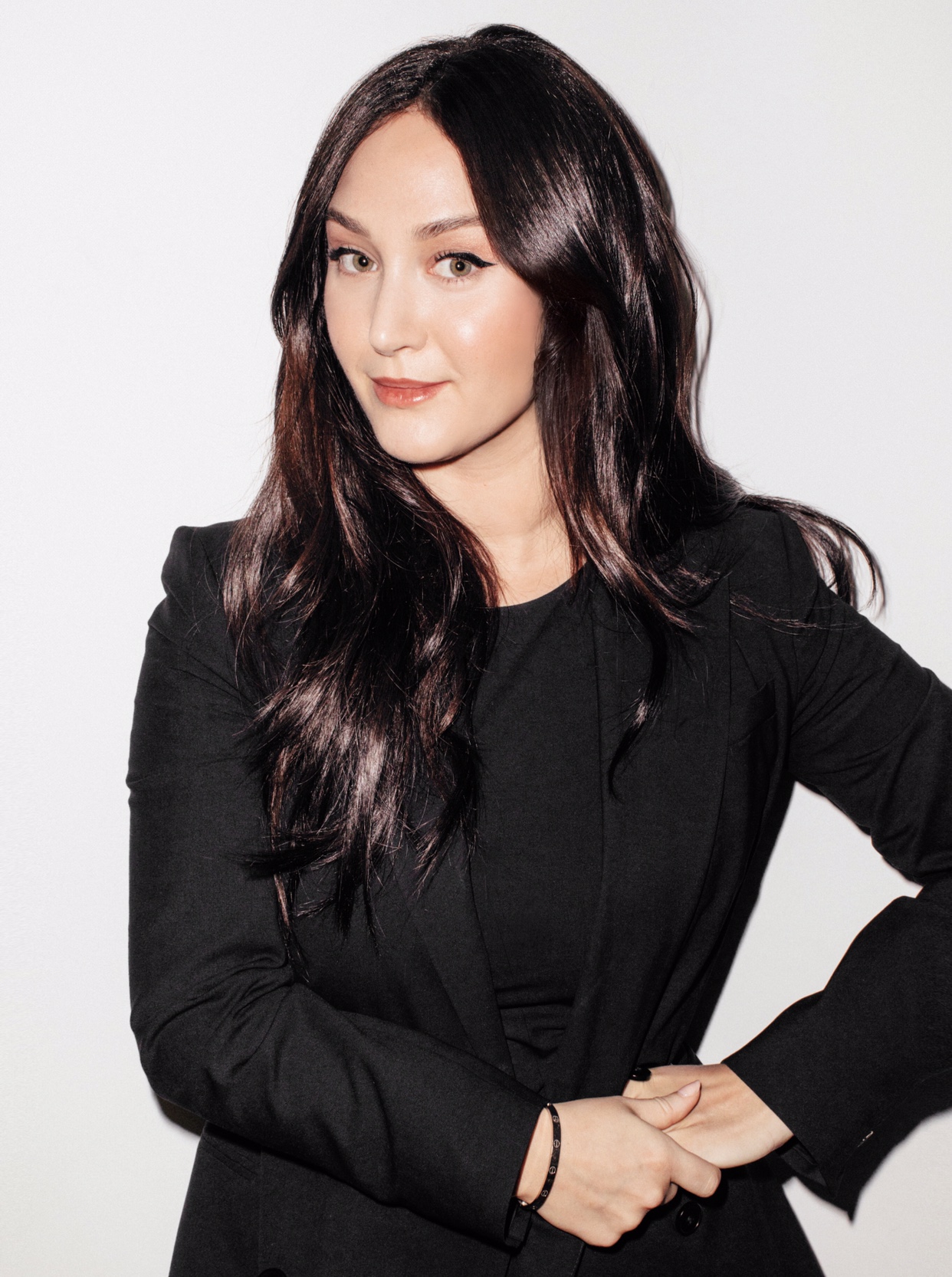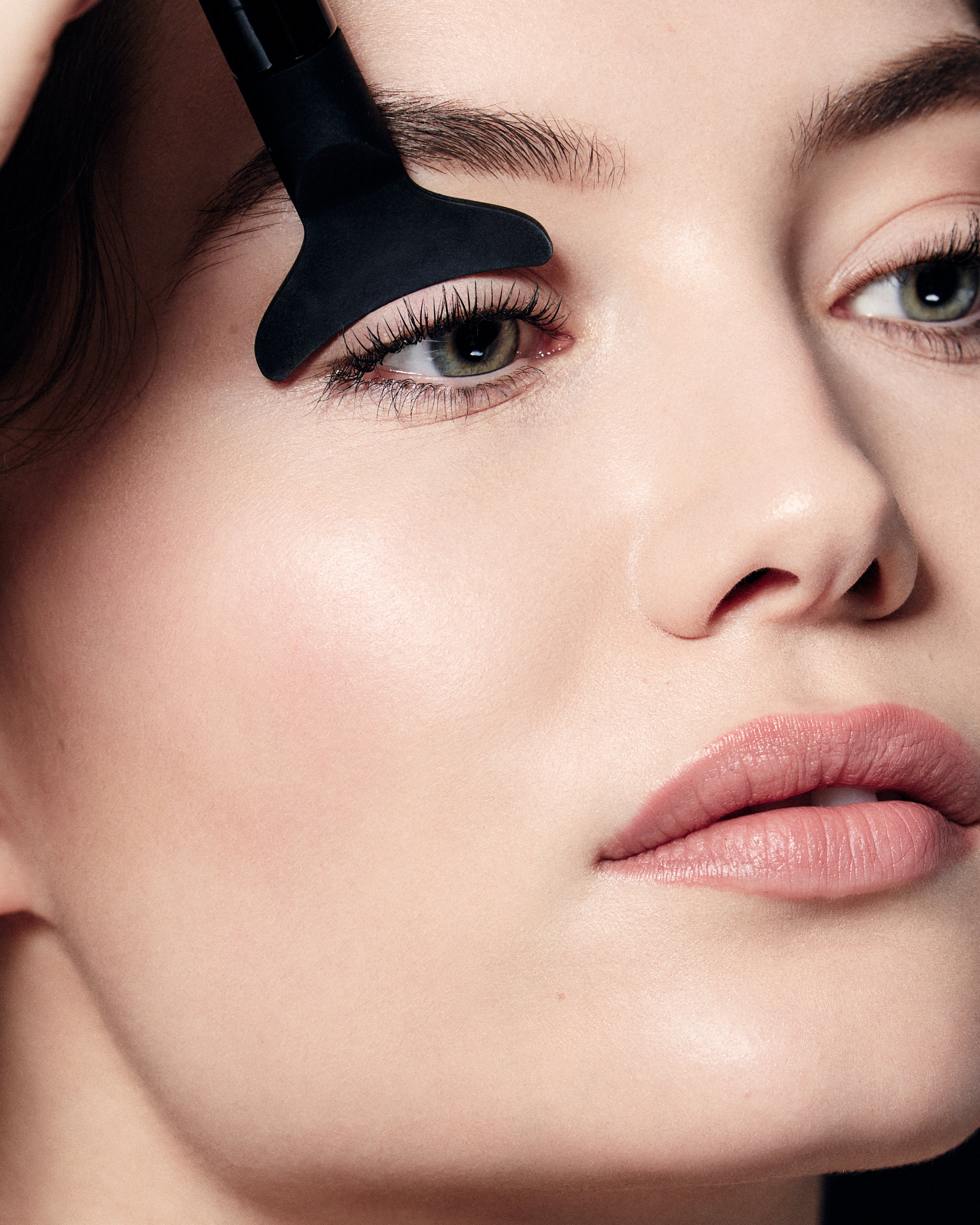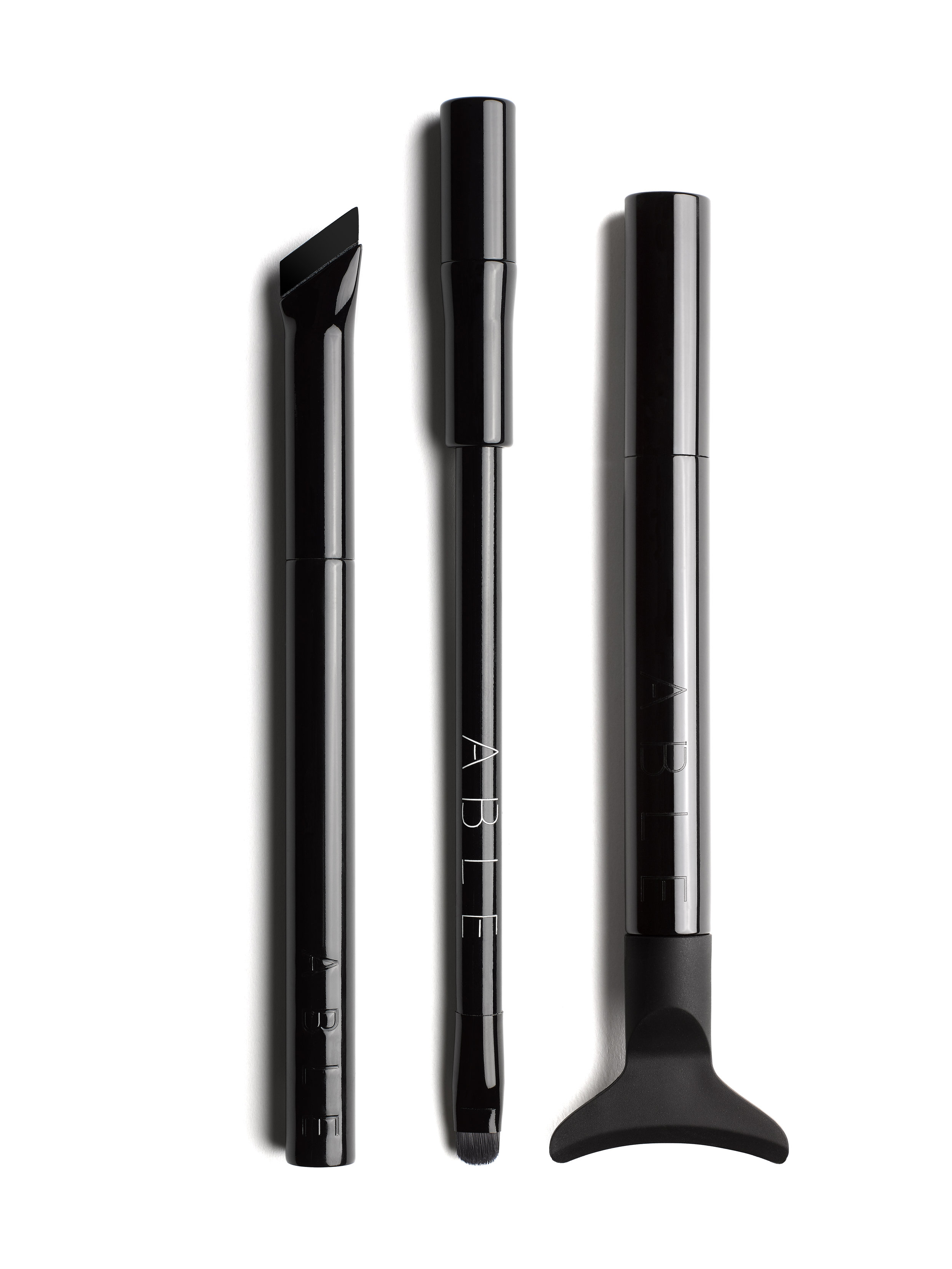FROM SCRATCH: This Founder Did Not Write a Business Plan But Here's Why She Recommends You Do
We know how daunting it can be to start a new business, especially if you’re disrupting an industry or creating an entirely new one. When there is no path to follow, the biggest question is, where do I start? There is so much to do but before you get ahead of yourself, let’s start at the beginning. To kickstart the process (and ease some of those first-time founder nerves) we’re asking successful entrepreneurs to share their story in our new series, From Scratch. But this isn’t your typical day in the life. We’re getting down to the nitty gritty from writing a business plan (or not) to sourcing manufacturers and how much they pay themselves, we’re not holding back. If you want to know how to start a business, you’ve come to the right place.
Photo: Courtesy of Able Cosmetics
Have you always dreamed of ditching the 9-to-5 to pursue your lifelong dream of starting a company? This is an alluring vision for many of us who would love to be the arbiters of our own time, but here’s the thing, you should probably weigh up all of the pros and cons before you take that leap, ensure that your “why” is stronger than your “what,” and that your desire to do it isn’t just about the money. Because if there’s one thing we’ve learned through all of the interviews with small business owners at C&C, it’s that starting your own business is way more work than an office job (think late nights and working weekends) and it takes time before you see any money come in—the founder of Pai Skincare didn’t pay herself for three years.
You also have to level set your expectations. Society glorifies the 30-under-30 founders and the companies that go public, but your brand doesn’t have to be the next unicorn. You can start small and stay small. That’s okay, too. But, as ABLE Cosmetics founder, Dana Rae Ashburn advised us in our interview for our From Scratch series, it’s a good idea to think about that in the beginning, set your intentions, and write a business plan so you have some structure from the outset.
Read on to hear how the makeup artist turned her passion into a business, why she hasn’t paid herself a cent yet, and the many (many) lessons she learned along the way. You might want to write these small business tips down.
Did you write a business plan? If yes, was it helpful? If no, what else did you use instead? Why did you not take that approach?
I did not write a business plan. My plan was to launch a product that had not been previously introduced to the beauty/cosmetics industry. I assumed people would buy it because it was the first of its kind. I had the misconception that business plans were just an educated guess, so it wasn’t worth making one. Boy, was I wrong. As someone who dove head first into launching a company without a clear-cut business plan, I would absolutely recommend making one. Why? Because even if a business plan is hypothetical, it provides you with some structure. It can give you goals and guidelines that inform your decisions in real time.
How did you come up with the name? What was the process like? How did you know it was the right name?
Deciding on a name was very difficult. My hero product, Cat Eye 101, was conceived long before the company name, ABLE, came to be. For me, the name “Cat Eye 101” identified the educational, instructional, and innovative design. When I first began exploring names, everything I was drawn to had been previously trademarked. It was very frustrating and this process took quite some time. One day, I decided to get out of my usual surroundings (New York City) in order to be inspired on the name front. I took a train to Philadelphia and spent the day with my most creative friend.
We went to Barnes & Noble, sat on the floor, and looked through books, all kinds of books. I came across a children’s book about a boy named Abel. Looking back, I wish I had bought it, but I was so thoroughly consumed by my “AHA!” moment that I rushed outside to share my revelation with everyone who had been helping me up to that point. Immediately, it made complete sense to call my brand ABLE. The tagline, “Your Face. Your Features. Your Skills,” immediately poured out once I identified the name ABLE. Long story short, sometimes you need to mix things up to get re-inspired. Sitting in the same spot, looking at the same thing, speaking to the same people is not the move. Step out of your comfort zone and surprise yourself.
What were the immediate things you had to take care of to set up the business?
Establishing a trademark, website, domain, Instagram, finding a publicist, regulatory reviews, liability insurance, UPC codes, etc. You know, all the un-fun, bureaucratic stuff that creative people like me run away from at full speed.
What research did you do for the brand beforehand? Why would you recommend it?
I did very little research beforehand. I was a young makeup artist with a strong idea. I didn’t know about focus groups or market research. I put on a metaphorical blindfold on and wrote checks. Looking back, I would certainly change that approach. I would organize a group of demographically diverse friends and send them sample products, asking for honest feedback on all fronts. Next, I’d speak with industry professionals/mentors. I’d research the competition, maybe even asking a few cosmetics buyers what they think of my big idea. I’d take Instagram polls and attempt to decipher whether my blueprint of an idea is a realistic source of revenue or an undeveloped pipe dream.
How did you find the manufacturer/production facility that you use? Did you have any bad experiences? What did you learn?
My first (and only to date) manufacturer was recommended to me by an industry veteran. Unfortunately, I was naive and decided to launch ABLE in the most expensive way possible without considering all of my options. Due to product stability failure and high COGS, my manufacturing experience has been unstable. If I were to go back in time, I would either tackle product development with a packaging consultant and a formula consultant or take it on myself and reallocate those funds into strong sales and marketing teams.
Did you self-fund the company? Did you raise seed money or initial investment money? Why/Why not?
ABLE is self-funded with the help of friends and family. I didn’t know where the company would go and I didn’t want to have the pressure of strangers’ money, so I did not seek funding in that capacity. Everyone involved was aware that I was diving into uncharted territory. They understood that if things went well, it would be a win. On the flip side, if things didn’t go well, at least I wouldn’t be indebted. I always wanted to own 100% of my company with full control. Now that I have been at it for a few years, I’d certainly explore other options, but maintain that it’s crucial to protect one’s intellectual property when forging an unprecedented path in any industry.
How much did you pay yourself? How did you know what to pay yourself?
To date, I have not paid myself a cent. Furthermore, almost everything I make as a freelance makeup artist outside of ABLE is invested into the company.
How big is your team now? What has the hiring process like?
Currently, my team consists of myself, a general business consultant, a PR consultant, and sales consultant (my fiancé, who I pay in hugs). What I have learned along the way is that everyone you meet in business will tell you they are crucial to your success. SEO experts are going to convince you they can augment your traffic and customer conversion. Marketing teams will send you massive quotes because you “need them in the digital age.” At the end of the day, you need to determine what third party support your brand actually needs, and from there, who you can afford in those departments.
“To date, I have not paid myself a cent. ”
Did you hire an accountant? Who helped you with the financial decisions and set up? What do you recommend?
Yes. I have a fantastic bookkeeper and accountant who keep things organized for me. They don’t help me with any type of growth plan, but the financial organization has been key to my understanding, reassessment and growth over the years.
What has been the biggest learning curve during the process of establishing a business?
The entire process of starting a company has been one big learning curve. I’m not sure it’s possible to be 100% prepared, I certainly wasn’t. In my experience, the financial contribution, sales funnel, and distribution have been the biggest challenges and learning curves.
How did you get retailers to start stocking your product? Were you told no? How did you handle that rejection?
Luckily (from a new brand’s perspective), everything is publicly accessible these days. You need to do research (Instagram, LinkedIn, etc.) in order to identify the buyers you need on your side. Are you selling makeup? You need the beauty buyer or even better the beauty buyer’s assistant. Each category of every industry has a buyer. It can be difficult to get the buyers’ attention because they receive so many emails, but you should follow up with an unsolicited gift (your product) and reach out with an email that says “Hi X, I popped a package in the mail for you to experience my product first hand. I have attached my digital catalogue. Please let me know if you are available to speak during any of the following times. Tuesday 10am, Wednesday 2pm, Friday 10am... Talk soon!”
ASSUME THE SALE. BE PERSISTENT. Even when they say “no,” you should keep a list of buyers’ information, so that whenever you have a new SKU launch or brand news, you can send a targeted email. I have had many buyers say “no,” and at first, I would be so offended, so angry. Then I started to tell myself “next time.” I continued to send my target buyers “ABLE News Updates,” which touched on everything behind-the-scenes. This keeps the brand at the top of buyers’ minds, so when the time is right, they’ll think to place an order. Sometimes, you’ll get an order that isn't actually “worth” it when you consider all of the backend expenses (shipping, packaging, employees). But it’s important to get your name out there, likely operating at a loss until you receive massive purchase orders and can scale up production.
“ I’m not sure it’s possible to be 100% prepared, I certainly wasn’t.”
Do you have a business coach or mentor? How has this person helped? Would you recommend one?
I had the honor of being a part of the 2017 Sephora Accelerate. I was introduced to a plethora of mentors and friends, all of whom have their own companies. I realized the importance of connecting with other founders. Now, I meet with fellow female entrepreneurs for coffee, or even just to share stories and find comfort in our mutual everyday struggles. It’s also great for networking and connections to share names and information of trusted consultants. You can always go to your industry friends and say “hey, do you have a good product shot photographer?” or “hey, who do you use to make your cartons?”
How did you promote your company? How did you get people to know who you are and create buzz?
ABLE’s buzz was created through strong press and social media presence. I spent time and money finding women on social media who really resonated with the brand aesthetically. You may need to gift to 100+ people to find five that will support you with unswerving commitment. As far as press, it’s ideal if you can connect with an amazing publicist to spread the word on your behalf.
However, it’s not always easy to find the right match in this department. Large PR companies have huge retainers and often treat you like a number, whereas smaller firms often lack the powerful connections of the former. In my opinion, the best situation is to find a freelance publicist who is genuinely invested in your brand and has personal connections with the media and influencers you are targeting.
What is one thing you didn’t do in the setup process, that ended up being crucial to the business and would advise others to do asap?
A sales team and a marketing team. I launched with neither and it took a huge toll on my inventory.
For those who haven’t started a business (or are about to) what advice do you have?
Have a story. Have a purpose. Have a differentiator. Know your competition as well as you know yourself.
Up Next: How a Successful Entrepreneur Built Her Beauty Brand From the Ground Up.



